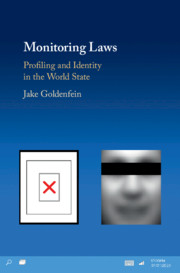Book contents
- Monitoring Laws
- Monitoring Laws
- Copyright page
- Contents
- Acknowledgements
- 1 Monitoring Laws
- 2 The Image and Institutional Identity
- 3 Images and Biometrics – Privacy and Stigmatisation
- 4 Dossiers, Behavioural Data, and Secret Speculation
- 5 Data Subject Rights and the Importance of Access
- 6 Automation, Actuarial Identity, and Law Enforcement Informatics
- 7 Algorithmic Accountability and the Statistical Legal Subject
- 8 From Photographic Image to Computer Vision
- 9 Person, Place, and Contest in the World State
- 10 Law and Legal Automation in the World State
- Index
7 - Algorithmic Accountability and the Statistical Legal Subject
Published online by Cambridge University Press: 08 November 2019
- Monitoring Laws
- Monitoring Laws
- Copyright page
- Contents
- Acknowledgements
- 1 Monitoring Laws
- 2 The Image and Institutional Identity
- 3 Images and Biometrics – Privacy and Stigmatisation
- 4 Dossiers, Behavioural Data, and Secret Speculation
- 5 Data Subject Rights and the Importance of Access
- 6 Automation, Actuarial Identity, and Law Enforcement Informatics
- 7 Algorithmic Accountability and the Statistical Legal Subject
- 8 From Photographic Image to Computer Vision
- 9 Person, Place, and Contest in the World State
- 10 Law and Legal Automation in the World State
- Index
Summary
Algorithmic accountability has emerged as a package of legal ideas that, on one hand, attempt to impose administrative law mechanisms such as transparency and due process on automated decision-making systems, and on the other hand, has developed computational approaches to constraining machine learning. In particular, by ensuring the complex computational analysis of individuals through machine learning models occurs more ‘fairly’, and is more explainable. As well as describing the necessity for computational legal implementations that actively constrain how data processing occurs, the chapter argues that there are risks that these mechanisms may involve ceding to data science and its corporate stakeholders the epistemological terrain as to what types of calculations are ‘fair’ and what type of information is an ‘explanation’.
Keywords
- Type
- Chapter
- Information
- Monitoring LawsProfiling and Identity in the World State, pp. 114 - 134Publisher: Cambridge University PressPrint publication year: 2019

